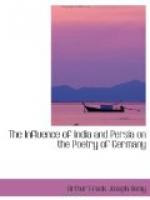* * * * *
There are, besides, many minor changes. The vidusaka, or fun-making attendant of the king, is left out, and so the warriors express the sentiments that he utters at the beginning of Act 2. Dusyanta does not bid farewell to his beloved in person, but leaves a letter. Again, after he has failed to recognize her, she returns to the hermitage of Kanva, whereas in the drama she is transported to that of Kasyapa on the Hemakuta mountain. So, of course, the aerial ride of the king in Indra’s wagon is also done away with.
In many places, on the other hand, the poem follows the drama very closely. For instance, the passage in the first canto describing the mad elephant (pp. 14, 15)[221] is a paraphrase of the warning uttered by one of the holy men in Act 1. Sc. 4 (ed. Kale, p. 40). The discourse of Sakuntala with her friends (pp. 37, 38), the incident of the bee and Priyamvada’s playful remark (pp. 38-40) are closely modelled after the fourth scene of Act 1. Many passages of the poem are in fact nothing but translations. Thus the words which the king on leaving, writes to Sakuntala (p. 78):
Doch mein Herz wird stets
zurueckbewegt,
Wie die wehende Fahne an der
Stange,
Die man vollem Wind entgegentraegt—
are a pretty close rendering of the final words of the king’s soliloquy at the end of Act 1:
gacchati purah
sariram dhavati pascad asamstutam cetah cinamsukam
iva ketoh prativatam
niyamanasya
“my body goes
forward; the mind not agreeing with it flies backward
like the silken streamer
of a banner borne against the wind.”
A large part of the whole poem is pure invention, designed to make the story more exciting by means of a greater variety of incident. Such invented episodes, for instance, are the gory battle-scenes that take up the first part of the fourth canto, the omen of the fishes in the fifth, and the episodes in which Bharata plays the chief role in that canto. Some of the things told of this boy, how he knocks down the gate-keeper who refuses to admit his mother, how he strikes the queen Vasumati who had insulted her, and how he slays the assassin whom this jealous queen had sent against him, are truly remarkable in view of the fact that the hero of all these exploits cannot be more than six years of age (see pp. 112, 113). The account in the Mahabharata, to be sure, tells of equally fabulous exploits performed by the youth, but there we move in an atmosphere of the marvelous. In Bodenstedt’s poem, however, the supernatural has been almost completely banished, and we cannot help noticing the improbability of these deeds.
FOOTNOTES:
[204] Hebrew by Jos. Choczner, Breslau, 1868; Dutch by van Krieken, Amst. 1875; English by E. d’Esterre, Hamb. 1880; Italian by Giuseppe Rossi, 1884; Polish by Dzialoszye, Warsaw, 1888. See list in G. Schenk, Friedr. Bodenstedt, Ein Dichterleben in seinen Briefen, Berl. 1893, pp. 246-248.




